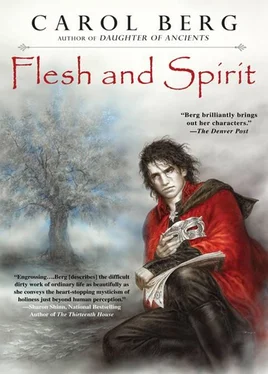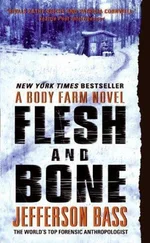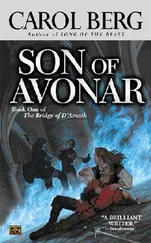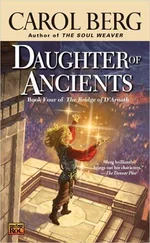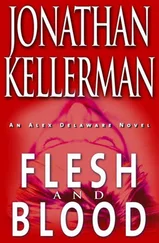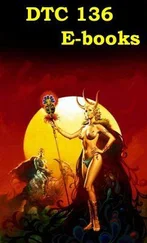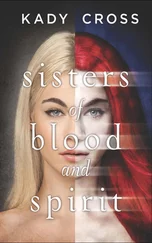Between supper and Compline, as the gray light filtering through the infirmary’s horn windows faded, I was alternately dozing and perusing the intricate little drawings attached to the margins and headings of my psalter. Though lacking the elaboration and gold leaf one would likely find in the abbey’s service books, the little codex had been created with the care always given holy books. Had Brother Horach himself inked the illustrations? The copyist had surely borne a fascination with the natural world, inserting energetic and sometimes fantastical representations of stags, foxes, and racing hounds alongside the angels and vines that graced the prayers and psalms. I speculated as to whether he had suited the beasts’ postures to the mood or sense of the prayer, which struck me as a clever idea.
Yawning, feeling lazy and dull-witted as always on the day after the doulon, I traced my fingertips over the letters as I had so often as a child. In those days, believing I might remedy my persistent failure to decipher the mystery of written words, I had allowed magic to roar from my body’s center into the confounding shapes on the page—scorching no few books in the endeavor. The fingers are the conduit of magic.
I no longer wasted my resources on that particular exercise. I had come to terms with my incapacity and managed well enough all these years. But if these holy brothers discovered my lack, they would surely pitch me over their lovely wall. That was damnably annoying.
I slammed the book shut and hunched deeper in the bed, warm and dry again after the previous day’s unsettling excursions. Jumbled thoughts of murdered monks and abbey benefactors who just happened to serve unsavory princes had plagued me all the boring day—or at least when I could avoid thinking of my empty nivat bag and the difficulty of refilling it. I had trained myself to set that worry aside for a few weeks between necessity, refusing to allow the disease or its unhealthy remedy to set the course of my life. The attack, a full week short of the usual and with so little warning, had profoundly unnerved me.
Under the more direct beams of the rushlight, Brother Anselm worried over his colored chart that detailed astrological influences on the body’s humors, certain he would find some correlation with my relapse in the cloister garth. Sooner or later the earnest fellow would approach the bed with his piss jar or his magnifying lens or his well-polished lancet, asking politely to examine my eyeballs or the underside of my tongue or to take some sample of my regenerating bodily fluids.
I was trying to decide whether to give in to sleep and thus keep good Anselm at bay, when a blast of cold air heralded Jullian’s appearance in the infirmary doorway. The boy was as pale as an Ardran milkmaid’s ass. “Brother Anselm, Brother Robierre summons you immediately with his medicine box and both litters. We’ve wounded soldiers at the gates!”
“Who?” I said, sitting up straight as Brother Anselm jumped from his stool and dragged litter poles from beneath the vacant beds.
“Ardrans. Fifty of them at the least. Or a hundred…bloody…torn to pieces…”
The boy’s peaked complexion and strangled declaration indicated that the evening’s events had already profoundly altered his understanding of the world. Exposure to ugly injuries such as mine was one thing, but four or five cadres’ worth of battle wounds would be far different. Angels preserve the boy from ever seeing the battlefield itself.
It had required many a tankard to dull the images of my own introduction to the soldiers’ mysteries. I had never subscribed to myths of noble purpose or personal glory in battle, but I had believed that shoving a spear into a twitching body busily shitting itself could make a man of me. I’d blundered through innumerable bloody days since, as much avoiding other fools’ spears and axes as wielding my own.
Brother Anselm wrapped the litter poles in their leather slings, dumped them into the boy’s outstretched arms, and threw a stack of linens atop the load. After tossing a few loose items from the shelves into a wooden chest, he slammed the lid, fastened the latch, and hefted it onto his shoulder. Before you could blink, only the chilly draft remained with me in the infirmary.
The laws of sanctuary and the sanctity of abbey walls seemed suddenly flimsy.
Two of the royal brothers, Perryn, Duc of Ardra, and Bayard, Duc of Morian, had maintained a deadly balance for three years. As no one had produced Eodward’s authentic writ stating elsewise, Bayard claimed the Navron throne by right and precedent as Eodward’s eldest son. But Eodward had granted Prince Perryn regency in Ardra—the ancient seat of Caedmon’s line—and Perryn insisted that this demonstrated Eodward’s intent to name him king over his poorly educated elder brother.
The third and youngest brother, Osriel the Bastard, regent of Evanore, had taken no active part in the three-year dispute save his grisly reaping on the battlefield. Some said Osriel cared naught for ruling on earth, but aimed to supplant the divine Magrog himself as lord of the netherworld. Others claimed he was waiting only for his brothers to weaken each other so he could sweep them both aside with an army of gatzi.
Only in the winter just past had stories of a fourth brother—this child Pretender—risen, and as sure as dead men stink, before the rumor could gather strength enough to create him a rival, Bayard had made a devil’s bargain that looked to win him the day. He had allied with the Harrowers.
The Harrowers denied both the elder gods and the Karish upstart Iero, claiming that Navrons had lost their proper fear of the true Powers who ruled the universe. Their priestess, Sila Diaglou, said that our cities and our plowing had defiled the land and that our false religions had caused us to forget these Powers that she called Gehoum, and that was why the weather had gone sour and the plagues and wars had risen.
For years people had laughed at a woman speaking out as if she were the divine prophet Karus come back again, set on changing the ways of the world. Yet, in the last years of Eodward’s reign, when pestilence and storms grew worse and the king could pay no mind to aught but Hansker raiders—Sila Diaglou’s direst predictions come true—folk began to listen and nod their heads. More and more wild-eyed rabble, dressed in rags and orange head scarves, heeded her call for burning and destruction to “harrow” the land and appease the Gehoum’s wrath. Scorned by priests and nobles, she had grown her ragtag band of lunatics into an army to rival those of Navronne’s princes.
Throughout the summer campaign, while Prince Perryn dithered and regrouped farther and farther south, claiming that no rabble could stand against his knights and legions, the Harrowers burnt villages and fields and left us nothing to eat and nothing to defend. And then Prince Bayard and Sila Diaglou had joined forces and swept us up like chaff from a threshing floor.
The abbey bells clanged in an urgent rhythm. Distant shouts, mysterious door bangings, and running footsteps from the infirmary courtyard accompanied the summons. The evening reeked of danger. Unable to lie still, I threw off my blankets and pulled on my wool shirt, trews, and hose.
A brown-clad body burst through the door and pelted down the long room to Brother Robierre’s shelves—the other young aspirant, Gerard, a soft, stammering boy of fourteen. He shoved bowls and basins aside, knocking half of them clattering to the floor. Then he whirled about, dark stains on his arms and in his eyes. “B-b-bonesaws. Where does he k-keep them? He said the far end…”
I was already on my feet, alder stick in hand. “In that great iron chest down below.”
Читать дальше
